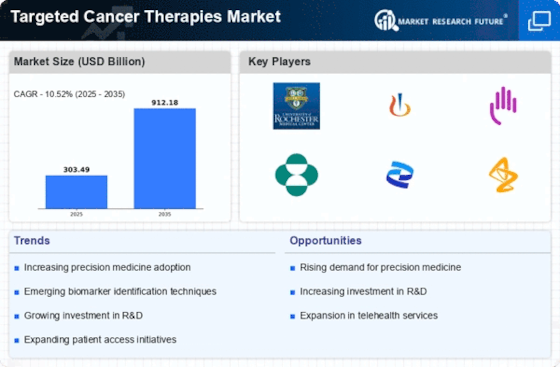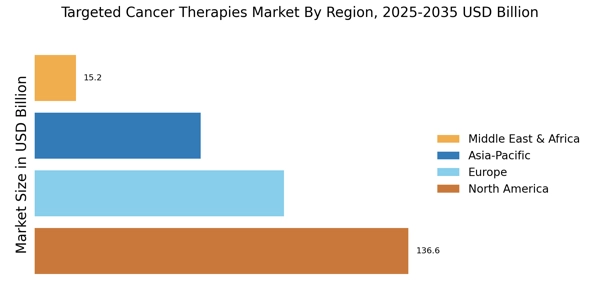Increasing Incidence of Cancer
The rising incidence of cancer worldwide is a significant driver for the Targeted Cancer Therapies Market. According to recent statistics, cancer cases are expected to rise by 70% over the next two decades, necessitating the development of more effective treatment options. This alarming trend has prompted healthcare systems to invest heavily in targeted therapies, which are designed to attack cancer cells while sparing healthy tissue. The market is likely to expand as healthcare providers seek innovative solutions to manage the growing patient population. Furthermore, the increasing awareness of cancer screening and early detection methods contributes to the identification of cancer at earlier stages, thereby increasing the demand for targeted therapies that can provide more effective treatment outcomes.
Advancements in Genomic Research
The Targeted Cancer Therapies Market is experiencing a surge in advancements in genomic research, which plays a pivotal role in the development of targeted therapies. The identification of specific genetic mutations associated with various cancers has led to the creation of drugs that can precisely target these anomalies. For instance, the discovery of mutations in the EGFR gene has resulted in the development of targeted therapies for non-small cell lung cancer. As of 2025, the market for targeted therapies is projected to reach approximately USD 100 billion, driven by the increasing number of approved therapies that are tailored to individual genetic profiles. This trend indicates a shift towards more personalized treatment options, enhancing the efficacy of cancer treatments and improving patient outcomes.
Growing Investment in Oncology Research
The Targeted Cancer Therapies Market is bolstered by growing investment in oncology research from both public and private sectors. Governments and pharmaceutical companies are increasingly allocating funds to research initiatives aimed at discovering novel targeted therapies. In 2025, it is estimated that global investment in cancer research will exceed USD 50 billion, reflecting a commitment to advancing treatment options. This financial support facilitates collaboration among researchers, healthcare providers, and academic institutions, fostering an environment conducive to innovation. As a result, the market is likely to see a proliferation of new therapies entering the pipeline, which could significantly enhance treatment efficacy and patient survival rates.
Regulatory Support for Targeted Therapies
Regulatory bodies are providing increasing support for the development and approval of targeted therapies, which is a crucial driver for the Targeted Cancer Therapies Market. Streamlined approval processes and incentives for orphan drugs are encouraging pharmaceutical companies to invest in the development of targeted treatments. As of 2025, several regulatory agencies have implemented frameworks that expedite the review of innovative therapies, allowing for faster access to life-saving treatments for patients. This supportive regulatory environment not only enhances the attractiveness of investing in targeted therapies but also ensures that patients benefit from the latest advancements in cancer treatment. The ongoing collaboration between regulatory bodies and the industry is likely to foster a more dynamic market landscape.
Technological Innovations in Drug Development
Technological innovations are transforming the landscape of the Targeted Cancer Therapies Market. The integration of artificial intelligence and machine learning in drug discovery processes is streamlining the identification of potential drug candidates. These technologies enable researchers to analyze vast datasets, leading to the rapid development of targeted therapies that are more effective and have fewer side effects. As of 2025, the market is witnessing a notable increase in the number of clinical trials focused on targeted therapies, with over 1,000 trials currently underway. This influx of innovation not only accelerates the pace of drug development but also enhances the overall efficiency of the therapeutic pipeline, ultimately benefiting patients with more effective treatment options.

















